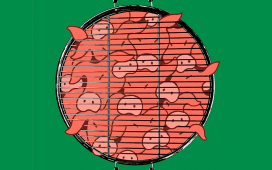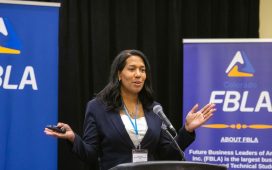Last November, Allison Fine resigned from the board of the prominent pro-choice group NARAL to enter the Democratic primary in New York’s Seventeenth Congressional District. Fine, a self-described futurist and activist, has written three books about online organizing, including “Momentum: Igniting Social Change in the Connected Age.” She came into her campaign already thinking about the tensions between new and old ways of connecting with people, and of building support. Then COVID-19 arrived. For those campaigning in the Seventeenth, which was hit by the virus as hard as anywhere else in the country, this meant that the very mechanics of the election were thrown into question. In-person campaigning was suspended. Local news attention turned elsewhere. Potential voters were out of work, stuck at home, and, in some cases, dying. Fine called her friend Seth Godin, a digital-marketing pioneer, who lives a few towns over. “I said, ‘All right, this will not be traditional in any sense of the word. What do I do?’ ” Fine told me. “And he laughed and said, ‘You know exactly what to do.’ ”
Fine announced that her campaign would go fully digital and embrace relational organizing, a buzzy term among political operatives for decentralizing campaigns and empowering volunteers. “The whole idea is to focus on identifying individual supporters,” she said, “and then providing them with tools to share information—about issues, or about me, or about the election—with their network.” In mid-March, Fine let her field team go, paused her fund-raising (“I just couldn’t, at that moment in time, as a human being, ask people for money”), and adjusted her plans for paid media, devoting more resources to online ads. She made the centerpiece of her campaign a daily newsletter, which goes out to a list of five thousand subscribers. It’s an intentionally stripped-down product: a chatty subject line followed by a short list of informational and diverting links, which Fine puts together every morning, after she’s had her breakfast and read through a hard copy of the Times. “We spend the rest of the day in conversation online on different platforms, whether it’s Facebook Live, Instagram, Twitter—wherever it is,” she said. “We’ve gone all-in with building and strengthening a social network to connect with voters.”
In recent weeks, much attention has been paid to how Donald Trump and Joe Biden—two of the most famous politicians on the planet, facing off in perhaps the most consequential election in America’s history—will navigate campaigning during the coronavirus crisis. But what about the thousands of other, essentially anonymous people running for office—whether for the local school board or the U.S. Senate—this year? Fine is facing six opponents, several of them better known and better funded than she. But each candidate is trying to respond to the same situation: how to reach people at a time of social distancing, how to hold people’s attention at a time of maximum distraction, and how to talk about the issues—from climate change to the noise of planes landing at Westchester County Airport—during a pandemic. “The people who are running for office, and the people who cover the people who are running, think elections are like the Super Bowl, in the sense that everyone is paying attention and it is universally absorbed, when, in fact, they’re a lot more like a local bowling league,” Godin said, when I called him to talk about the race. Most political campaigns, Godin believes, are operating as if it’s still the twentieth century, when people consumed media passively and television was king. “The pandemic,” he said, “is going to expose what electoral politics in the United States actually has become.”
The Seventeenth District is an arrowhead-shaped patch of New York State split fairly neatly in two, both geographically and culturally, by the lower Hudson River. Situated just north of New York City, and full of wealthy commuters, it is among the most affluent congressional districts in the country. And, yet, politically, like many districts, it is not a coherent whole. “It’s an absolute chasm, in terms of the political culture of the two halves of the district,” Barry Caro, a local political consultant, told me. The eastern half of the Seventeenth covers northern and central Westchester County, including the towns of Chappaqua and Scarsdale—perhaps America’s quintessential rich suburbs, once a backdrop for John Cheever’s short stories and today the home of Bill and Hillary Clinton. These bastions of Northeastern wealth are surrounded by pockets of poorer communities. The district’s western half, Rockland County—the point of the arrowhead— is more uniformly middle class. It is often described simply as more blue-collar and conservative than Westchester, though locals will tell you it’s a blend of white, black, immigrant, and Hasidic Jewish communities.
Since 1989, the region has been represented in Congress by Nita Lowey, a Democrat who quietly rose to become the first woman in history to chair the powerful House Appropriations Committee. “Nita Lowey has been around for so long that people’s careers began and ended waiting for a clear path to that seat,” Mark Lungariello, a political reporter for the Journal News, the district’s most important daily, said. In October, that path finally opened. Lowey, who is eighty-two, announced that she would not seek reëlection in 2020. A rush of candidates came forward. There were, at one point, sixteen people in the race; early on, it was rumored that even Chelsea Clinton, the former First Daughter, would seek the seat.
Now, with less than a month to go before the Democratic primary, which is scheduled for June 23rd, the field is down to seven candidates. In addition to Fine, there are two Davids: David Carlucci, a state senator from Rockland County and a founding member of the Independent Democratic Conference, which for years voted with Republican lawmakers to block progressive legislation in Albany; and David Buchwald, a veteran state assemblyman from Westchester County with a particular interest in Trump’s taxes. There is also Mondaire Jones, a young, lefty lawyer who supports Medicare for All; Evelyn Farkas, a former Defense Department official who has raised her profile in recent years as a Trump-Russia analyst on MSNBC; Asha Castleberry-Hernandez, a military veteran running as a national-security candidate; and Adam Schleifer, a former federal prosecutor who is heir to a local pharmaceutical fortune. (An eighth candidate, Catherine Parker, a Westchester County legislator, dropped out at the end of May.)
In such a blue district, the Democratic primary essentially is the election. The winner later this month will almost certainly be the Seventeenth’s next representative in Congress. But, at this point, it’s very hard to say who that winner will be. There’s been no public polling in the race, and it’s widely believed that, in most, if not all, of the private polls commissioned by the campaigns, “undecided” still led the field going into the race’s final weeks. In April, in an attempt to create safer conditions for voting, Governor Andrew Cuomo ordered that all voters in the state receive absentee-ballot applications in the mail. But it’s plausible that, because of the size of the field, ten or fifteen thousand votes, in a district with more than seven hundred thousand residents, may be enough to win a seat in Congress. Meanwhile, the race has become one of the most expensive primaries in the country, with three candidates—Farkas, Jones, and Schleifer—poised to spend more than a million dollars each, and three others—Buchwald, Fine, and Carlucci—raising hundreds of thousands of dollars of their own. The next three weeks in the district are expected to be a blizzard of television ads, mailers, and phone calls, all trying to make up for the lack of organic local interest in the race. “They’re in the blind,” Barrett Seaman, a former White House correspondent for Time magazine who now writes for the Hudson Independent, a local monthly, said. “They’re just a bunch of people with blindfolds on wandering through a room wondering when they’re going to hit a wall.”








